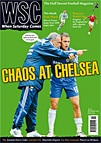 There's only one Steve McClaren, for now
There's only one Steve McClaren, for now
The euphoria that followed England’s victories against Israel and Russia was perhaps understandable, especially in the context of what had gone before. The two 3-0 wins against opponents with half-decent records (however badly Israel played) came after a run of just two victories in nine matches – and those previous successes had been against Andorra and Estonia. And Steve McClaren had seen off a side coached by Guus Hiddink, a man widely tipped as a candidate for his job.